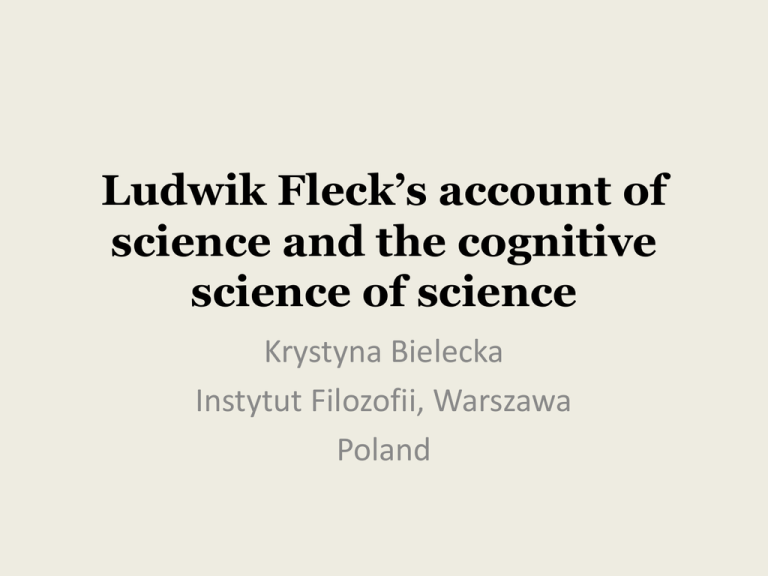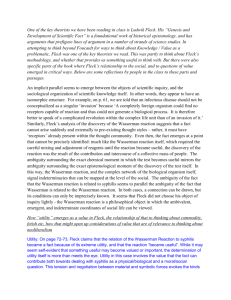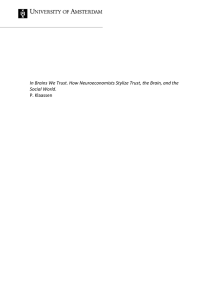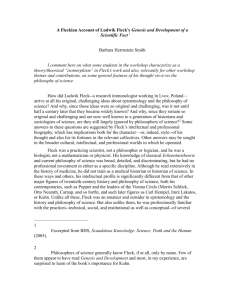Krystyna Bielecka – Ludwik Fleck`s account of science and the
advertisement

Ludwik Fleck’s account of science and the cognitive science of science Krystyna Bielecka Instytut Filozofii, Warszawa Poland Ludwik Fleck • 1896 – 1961, born in Lviev • Polish-Jew physician and microbiologist • Author of the first system of the historical philosophy and sociology of science (before Kuhn) • Assistant of Rudolf Wiegl, famous typhus specialist • Author of ”Genesis and Development of a Scientific Fact: An Introduction to the Theory of Thought Style and Thought Collective” • L.Fleck was deported to Buchenwald and forced to produce anti-typhus vaccine for Germans Actually, they didn’t work • But unexpectedly only for Germans, they had worked for ghetto prisoners before... The received view of science • All we need to say about science is a logical collection of facts, hypotheses and justification • Science is in progress, we eventually approach the Truth • Antipsychological • Antisocial • Antihistorical Thomas Kuhn • Paradigm shift – used by Fleck before Kuhn, not only related to historical factors but also to psychological and social facts • Incommensurability – used by Fleck before • Scientific revolution – a (satisfactory) concept missing in Fleck’s theory • Kuhn himself cites Fleck • They have much in common Fleck’s system • Psychological: • Sociological: the role of education (the flow of information and the climate for individual thought) • Historical • When people begin to exchange ideas, a thought collective arises, bonded by a specific mood, and as a result of a series of understandings and misunderstandings a peculiar thought style is developed. (Scientific) thought collective • Can be non-scientific as well • Ideas circulate within a collective and every individual adds something new I1 transformation I2 • Structure of a collective: esoteric circles – specialists exoteric circles – average people related to specialists and specialists Any individual is a part of exoteric circles and only sometimes can be a part of an esoteric circle Cognition as social act • Every cognition is a social act (…) for during every lasting exchange of thoughts there appear and grow ideas and standards which are not associated with any individual author. A communal mode of thinking develops which binds all participants, and certainly determines every act of cognition. Therefore, cognition must be considered as a function of three components: it is a relation between the individual subject, the certain object and the given community of thinking (Denkkollektiv), within which the subject acts; it works only when a certain style of thinking (Denkstil), originating in the given community is used (1986). Collective mood • The force which maintains the collective and unites its members is derived from the community of the collective mood. This mood produces the readiness for an identically directed perception, evaluation and use of what is perceived, i.e. a common thoughtstyle (1936, V). • It is one of basic factors creating a new thought style: it gives “a driving power”(1934) • It straightens up the ties among the group members and inclines them to act in this way Collective mood and the flow of information • Part of a collective mood arises at the point of contact between esoteric and exoteric circles. • → members of exoteric circles usually trust professionals and they admire them. • → members of esoteric circles act under pressure of expectations of the masses. When a certain domain lacks support from outside, it does not have significant achievements Thought style • Readiness for directed perception, with corresponding mental and objective assimilation of what has so perceived, characterized by specific problems of interest, by judgements which the thought collective considers evident and by methods which are applied as a means of cognition (1935a,IV.3) Incommensurability of thought styles What is a fact to the members of a thought collective A sometimes does not exist to the members of a thought collective B, and a thought that is significant and true to the members of A may sometimes be false or meaningless for members of B. • In historical development of science there are no invariants “It is not possible to express with today's words the content of a view of a distant epoch since particular notions of this epoch are incommensurable with the ones of today” (1939a). Syphilis example • Science fluctuates: – The proto-idea of syphilis blood has nothing to do with contemporary Wassermann's reaction • In scientific process there is nothing necessary: – if e.g. Sigle's idea of protozoa-like structures as the causative agent of syphilis had acquired sufficient support, we would have reached a harmonious system of knowledge different from the current one. Fleck and cognitive science • Distributed cognition – social and psychological factors • Role of affect in science and cognition – a basic motivator for development • Natural kinds debate – antiessentialism • Controversies: – Antirealism – Progress Syphilis example • In scientific process there is no simple linear progress: – The scope of the name “syphilis” would have been somewhat different than it is today, just like the methods of research and therapy would. But when a certain thought style develops and dominates researchers' minds, alternative ways of development become closed. • Fleck and definitions (natural kinds debate): – if one defined syphilis as a “carnal scourge”, then other diseases like gonorrhea, soft chancre, etc. would be cases of syphilis; and when proper experiments had been conducted one stated for example that “sometimes mercury does not cure the carnal scourge but makes it even worse”. Czesław Nosal and cognitive styles • He argues against Kuhn that his system is not psychological enough • Maybe Kuhn should have cited Fleck and his idea of psychological factors (as individual creativity, abilities and preferences) • Generally, the idea of various scientists’ profiles can deepen Fleck’s idea of the role of psychological factor in science, especially the role of individual scientists and their way of working • And scientists of different cognitive styles are predestinated to discover problems in different way that help to discover different nature of such problems Robert Sternberg’s cognitive styles • Hierarchical: holds multiple goals simultaneously and prioritizes them • Oligarchic: involve also difficulty prioritizing • Monarchic: focuses on a single activity until completion • Anarchic: resists conformity to "systems, rules, or particular approaches to problems” Robert Sternberg’s cognitive styles 2 levels of mental self-government: • Global: abstract and complex problems • Local: concrete problems 2 scopes of mental self-government: • Internal: inwards, works independently • External: outwards, in collaboration Others role of psychological individualism in science: Feynmann (1999) and a connection between psychology of creativity and non-standard scientific thinking Bibliography • • • • • • • Ludwik Fleck 1934, “Jak powstał odczyn Bordet-Wassermanna i jak w ogóle powstaje odkrycie naukowe?“, Polska Gazeta Lekarska, 3: 181–182 and 202–205. 1935a, Entstehung und Entwicklung einer wissenschaftlichen Tatsache. Einführung in die Lehre vom Denkstil und Denkkollektiv, Benno Schwabe und Co. (Genesis and Development of a Scientific Fact, transl. by Fred Bradley and Thaddeus J. Trenn, Thaddeus J. Trenn and Robert K. Merton (eds.), “Foreword” by Thomas S. Kuhn, Chicago: Chicago University Press 1979.) 1935b, “O obserwacji naukowej i postrzeganiu w ogóle”, Przegląd Filozoficzny 38: 57–76. (“Scientific Observation and Perception in General”, in R. S. Cohen and Th. Schnelle (eds.), 1986, pp. 59–78). 1935c, “Zur Frage der Grundlagen der medizinischen Erkenntnis”, Klinische Wochenschrift, 14: 1255–1259. (“On the Questions of the Foundations of Medical Knowledge”, transl. by Thaddeus J. Trenn, The Journal of Medicine and Philosophy, 6 (1981): 237–255). 1936, “Zagadnienie teorii poznawania”, Przegląd Filozoficzny, 39: 3–37. (“The Problem of Epistemology”, in R. S. Cohen and Th. Schnelle (eds.), 1986, pp. 79–112). 1986, “Crisis in Science. Towards a Free and More Human Science”, in R. S. Cohen and Th. Schnelle (eds.), 1986, pp. 153–158. Cz.Nosal 2007, „Psychologia poznania naukowego – umysły i problemy”, Nauka 2 • Passive elements: results of employing conceptual measure which resulted from historical and cultural circumstances to the results of experiments, developed in a thought style • Active elements: disguised definitions (nothing is necessary in definitions, they are chosen for pragmatic and estethics reasons): representation – if defined linguistically, then most animals do not have it, if defined neurologically, then almost every living creture can have it











